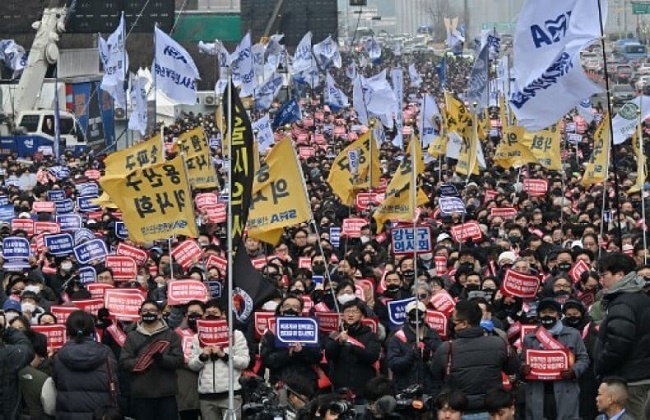
South Korea said Tuesday it would start notifying striking trainee doctors that their medical licences would be suspended, as it moves to punish medics who have quit hospitals in protest at training reforms.
Thousands of junior doctors handed in their resignation notice and stopped working two weeks ago to protest against an increase in medical school admissions from next year which the government says is meant to help combat shortages and meet the demands of an ageing society.
The striking trainees have defied a February 29 government deadline to return to work or face legal action, including possible arrest or suspension of their medical licences.
The government has identified some 7,800 junior doctors who have defied the back to work order and officials will send them notifications of their pending licence suspensions starting Tuesday, Second Vice Health Minister Park Min-soo told a press conference.
“As soon as their violations of the back to work orders are confirmed, we will send out advance notice of administrative measure starting today,” Park said, referring to the licence suspension.
Despite the warning of suspension, striking junior doctors have not returned to work on any significant scale, government data shows.
As of Monday nearly 9,000 trainee doctors remained on walkouts, Park said, a figure that has not significantly changed over the last two weeks.
“The government will respond in accordance with laws and principles to keep acts of threatening people’s lives and health from occurring again,” Park said.
The mass work stoppage has taken a toll on hospitals, with crucial treatments and surgeries cancelled, prompting the government to raise its public health alert to the highest level.
Around half of the surgeries scheduled at some major hospitals have been cancelled since last week, according to the health ministry.
Under South Korean law, doctors are restricted from striking, and the government has requested police investigate people connected to the stoppage.
Junior doctors argue that the healthcare system’s over-reliance on trainees is unreasonable and unfair.
They also argue that the reforms are the last straw in a profession where they already face challenging working conditions, including gruelling hours in emergency rooms.
“I’m anxious and scared,” a resigned trainee doctor, who wished to remain anonymous, told reporters Tuesday.

